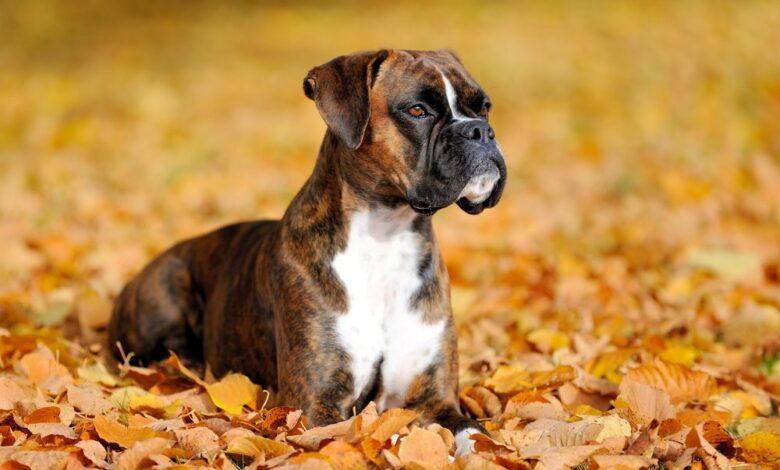Boxer Puppies: Top Tips for Training and Socializing

Boxer puppies have won the hearts of dog lovers worldwide with their playful personalities, strong protective instincts, and affectionate nature. Whether you’re considering bringing home a Boxer puppy or simply curious about the breed, this guide will cover everything you need to know about Boxer puppies. From their origins and characteristics to how to raise a healthy, happy Boxer, we’ll dive deep into all aspects of Boxer puppy care. If you’re looking for a new furry friend, the Boxer puppy might just be the perfect companion for you!
Understanding Boxer Puppies
History and Origin of Boxer Dogs
The Boxer breed is a product of a mix of ancient breeds, including the now-extinct Bullenbeisser, which was used for hunting large game. This breed was originally bred in Germany in the late 19th century, and they were recognized for their strength and intelligence. Boxers were used in various roles, from hunting to guarding, and their bold and loyal personalities made them popular as family pets. They were later refined to become the playful and affectionate dogs we know today.
Boxers are also closely related to the bulldog breed, which is evident in their strong, muscular bodies and characteristic square jaws. They were named “Boxers” due to their playful behavior, which includes standing on their hind legs and using their paws to interact, much like boxers in the ring. Today, Boxer puppies are primarily bred for companionship, guarding, and service work, making them one of the most versatile dog breeds. Understanding the history of the Boxer can give you a deeper appreciation of their personality traits and instincts.
Physical Features of Boxer Puppies
Boxer puppies are easily identifiable by their muscular build, large heads, and short, smooth coats. When they are born, Boxer puppies are typically small and adorable, but they grow quickly, gaining muscle mass and developing a well-defined physique as they mature. Their coat colors can range from fawn, brindle, or white, often with a distinctive white mark on the chest or paws. Their large, expressive eyes, combined with their muscular frame, give them a unique look.
One of the key physical features of Boxer puppies is their strong jawline and wide mouth. These puppies have a well-developed bite, as they were originally bred to hold and restrain large animals. As Boxer puppies mature, their height typically ranges from 21 to 25 inches, and their weight can range between 55 to 70 pounds. It’s important to provide them with adequate nutrition and exercise to help maintain their strong and healthy bodies. Their physical traits not only make them great working dogs but also contribute to their reputation as affectionate and loyal family companions.
Temperament of Boxer Puppies
The temperament of Boxer puppies is one of their most appealing traits. Known for their playful and energetic nature, Boxers are full of enthusiasm and joy. They are intelligent and quick learners, making them relatively easy to train when consistent methods are used. However, their energetic and sometimes stubborn nature can present challenges for first-time dog owners. Boxer puppies thrive on interaction with their family and will often seek attention and affection from their owners.
Despite their playful nature, Boxer puppies also have a protective side. They are naturally cautious around strangers and will alert their owners to any potential threats. This instinct makes them excellent guard dogs, but it also means that proper socialization is crucial. Boxer puppies are often described as “clownish” due to their sense of humor and tendency to make people laugh with their antics. However, they are also extremely loyal and form strong bonds with their families. Overall, Boxer puppies are affectionate, playful, and protective, making them a great choice for families, especially those with active lifestyles.
Bringing Home a Boxer Puppy
Choosing the Right Boxer Puppy
When bringing a Boxer puppy into your home, it’s crucial to choose the right one. There are a few key factors to consider before making this decision. First, consider whether you want to adopt a Boxer puppy from a shelter or purchase one from a breeder. Both options come with their advantages, but when selecting a puppy, ensure you are choosing one that is healthy and well-socialized. A good breeder will provide you with information about the puppy’s lineage, health history, and any potential genetic issues.
If you choose to adopt, it’s important to meet the puppy’s parents and ask about their temperament, as this can give you insight into how your future puppy may behave. When selecting a puppy, look for one that is alert, curious, and has a healthy, shiny coat. Boxer puppies should not appear lethargic or show signs of illness. A good sign of a healthy Boxer puppy is one that interacts well with people and other dogs, displaying the playful and friendly traits typical of the breed. Whether you adopt or purchase, choosing a Boxer puppy is a commitment that requires careful consideration and research.
Preparing Your Home for a Boxer Puppy
Once you’ve chosen your Boxer puppy, it’s time to prepare your home. Boxer puppies are energetic and will need a space where they can safely explore and play. Make sure to create a designated area where your puppy can rest and sleep comfortably. This could be a cozy bed in a quiet part of your home, such as a corner in the living room or a bedroom. A crate is also essential for crate training and providing your puppy with a secure, private space when you’re not around.
In addition to a bed and crate, you’ll need a few essential supplies, including toys for mental stimulation, a food and water bowl, and a collar and leash. Boxer puppies are known for their chewing habits, so providing chew toys can help keep them occupied and prevent damage to furniture. You should also puppy-proof your home by removing any harmful items such as cleaning supplies, electrical cords, and small objects that could be a choking hazard. Proper preparation will help your Boxer puppy settle in and adjust to their new environment quickly.
The First Few Days with Your Boxer Puppy
The first few days with your new Boxer puppy are crucial for bonding and setting the tone for the future relationship. It’s essential to establish a routine right away to help your puppy feel secure. Introduce your puppy to its new home slowly, allowing them to explore different areas at their own pace. Be patient and gentle as they adjust to the new sounds, smells, and people around them.
During this time, it’s important to start building a relationship based on trust and positive reinforcement. Begin basic training early, focusing on simple commands like “sit,” “stay,” and “come.” Consistency is key, so be sure to use the same commands and reward your puppy with treats and praise. Keep in mind that Boxer puppies are curious and active, so they may get into mischief. Redirecting their energy towards toys or engaging them in play can prevent unwanted behaviors. Over time, your puppy will become more comfortable and start to form a deep bond with you and your family.
Raising and Caring for Boxer Puppies
Feeding and Nutrition
Proper nutrition is crucial for Boxer puppies to grow strong and healthy. During their first few months, they require high-quality puppy food that is rich in proteins, fats, and essential nutrients to support their rapid growth. Look for a food that is specifically designed for large-breed puppies, as these formulas help manage the growth rate and ensure that the puppy’s bones and joints develop properly. You may also want to consult your veterinarian to determine the best food for your Boxer puppy’s unique needs.
As your Boxer puppy grows, you’ll need to adjust their diet. When they reach adulthood, their nutritional needs change, and you’ll need to transition them to an adult dog food formula. It’s important not to overfeed your Boxer puppy, as their energetic nature may lead them to gain weight quickly. Stick to the recommended feeding schedule and monitor their weight and health. Fresh water should always be available to keep your Boxer hydrated, especially after playtime or exercise.
Exercise and Playtime
Boxer puppies are known for their high energy and playful nature, which means they need plenty of exercise and playtime. Regular exercise is essential to keep your Boxer puppy physically fit and mentally stimulated. Start with short walks, gradually increasing the duration as your puppy gets older and builds stamina. Playtime in a securely fenced yard or a dog park is also a great way for your puppy to burn off energy.
Boxers enjoy interactive play, so games like fetch or tug-of-war are ideal for engaging them. It’s also important to provide mental stimulation through training and puzzle toys. Boxers are intelligent dogs, and keeping them mentally challenged helps prevent boredom and destructive behavior. Regular exercise and playtime will help your Boxer puppy develop a strong bond with you while keeping them healthy and happy.
Training a Boxer Puppy
Training a Boxer puppy can be a rewarding experience, as they are intelligent and eager to please. However, their playful and sometimes stubborn nature can make training challenging. Start training early with simple commands like “sit,” “stay,” and “come.” Use positive reinforcement techniques such as treats, praise, and toys to reward your puppy when they follow commands.
Socialization is also an important part of training. Boxer puppies should be exposed to different people, dogs, and environments to help them become well-rounded and confident. Enroll in a puppy class or organize playdates with other dogs to help them develop good social skills. Consistent training, combined with positive reinforcement, will ensure that your Boxer puppy grows into a well-behaved and happy adult dog.
Health Care and Grooming
Like all puppies, Boxer puppies require regular veterinary care to ensure they stay healthy. Regular vaccinations and check-ups are essential to prevent common illnesses and catch any health issues early. Boxer puppies are prone to certain health problems, such as hip dysplasia and heart conditions, so it’s important to monitor their health closely. A veterinarian can guide you on the best preventative measures for your puppy.
Grooming needs for Boxer puppies are relatively low, as their short coats don’t require frequent brushing. However, regular brushing can help remove loose hair and keep their coat shiny. Boxer puppies also need regular nail trimming and occasional baths. Make sure to check their ears for signs of infection and clean them as needed. Proper grooming not only keeps your Boxer puppy looking good but also contributes to their overall health and well-being.
Common Challenges with Boxer Puppies
Dealing with Separation Anxiety
Boxer puppies are known for their strong bonds with their owners, but this can sometimes lead to separation anxiety when left alone. If your puppy becomes overly anxious when you leave the house, it may display signs such as excessive barking, destructive behavior, or house soiling. To prevent separation anxiety, it’s important to gradually get your puppy used to being alone. Start by leaving them alone for short periods and gradually increase the duration as they become more comfortable.
You can also help alleviate separation anxiety by providing your puppy with interactive toys or a puzzle feeder to keep them occupied. Consider crate training to provide a safe, secure environment when you’re not home. With patience and consistency, you can help your Boxer puppy feel more relaxed when alone and reduce the chances of separation anxiety.
Managing Hyperactivity and High Energy
Boxer puppies are known for their boundless energy, which can sometimes be overwhelming. If you don’t provide them with enough physical and mental stimulation, they may become hyperactive or engage in destructive behaviors. To manage your puppy’s energy, establish a daily routine that includes plenty of exercise, playtime, and training. A tired puppy is a well-behaved puppy, so make sure to tire out your Boxer puppy with walks, games, and activities.
If your Boxer puppy is particularly hyperactive, it’s important to recognize that they may need more mental stimulation. Training sessions, puzzle toys, and interactive play can help keep your puppy engaged and prevent them from becoming overly excited or destructive.
Handling Health Concerns in Boxer Puppies
Like all breeds, Boxer puppies are prone to certain health issues. Hip dysplasia, heart conditions, and certain cancers are more common in Boxers. Regular vet visits are essential for catching these conditions early and providing appropriate treatment. Boxers are also prone to bloat, a life-threatening condition that requires immediate medical attention. Signs of bloat include restlessness, a swollen abdomen, and difficulty breathing. If you notice any of these symptoms, seek veterinary care immediately.
It’s also important to monitor your Boxer puppy’s weight and nutrition, as obesity can lead to joint and heart problems later in life. Keeping your puppy at a healthy weight and providing them with a balanced diet will help them live a long, happy life.
Conclusion: Boxer puppies
Boxer puppies are an incredibly rewarding breed to raise, offering endless love, laughter, and loyalty. Their playful, energetic nature makes them perfect for active families, while their protective instincts ensure that they will always watch over their loved ones. With the right care, training, and attention to their physical and emotional needs, a Boxer puppy can grow into a wonderful adult dog that will bring joy to your home for years to come.



